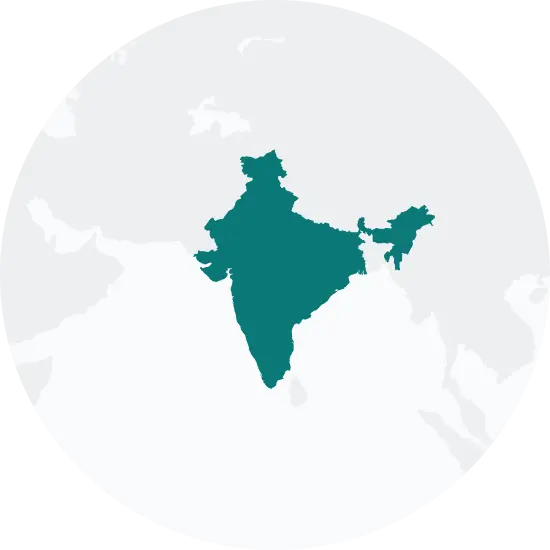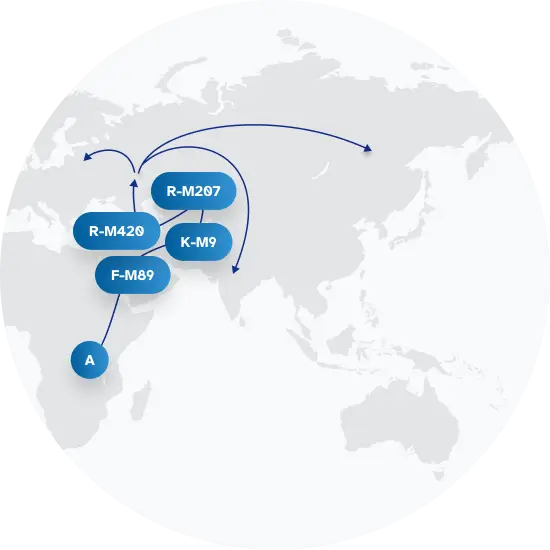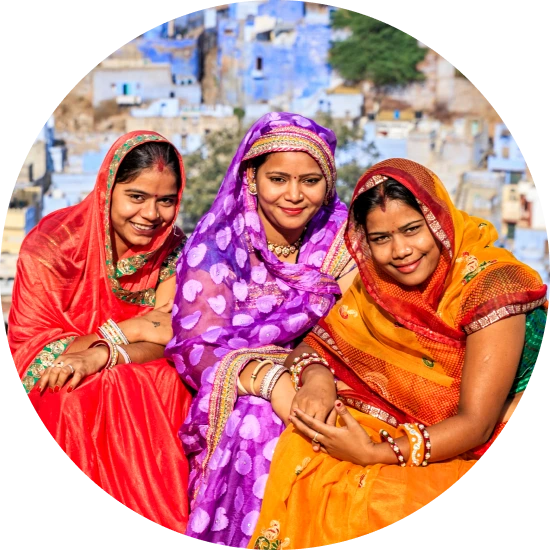Explore the Family Name Kumar
How common is the last name Kumar in the United States?
Based on the Decennial U.S. Census, the popularity of the surname Kumar has significantly increased in the United States between 2000 and 2010. In 2000, it was ranked as the 2293rd most popular surname but by 2010, it had leapt to the 1357th position, representing a substantial growth rate of 40.82%. The count of individuals with this surname also surged by 79%, from 14,517 in 2000 to 25,986 in 2010. Consequently, the proportion of people named Kumar per 100,000 rose by 63.75%, from 5.38 in 2000 to 8.81 in 2010.
| 2000 | 2010 | Change | |
|---|---|---|---|
| Rank | #2,293 | #1,357 | 40.82% |
| Count | 14,517 | 25,986 | 79% |
| Proportion per 100k | 5.38 | 8.81 | 63.75% |
Race and Ethnicity of people with the last name Kumar
In terms of ethnicity, data from the Decennial U.S. Census shows that the surname Kumar is predominantly associated with the Asian/Pacific Islander group. In 2000, 83.83% of the individuals bearing this surname identified as Asian/Pacific Islander, and this figure increased by 5.28% to 88.26% by 2010. Notably, there was a significant decrease of 44.64% in the percentage of people with this surname identifying with two or more races, dropping from 8.87% in 2000 to 4.91% in 2010. The percentage of White, Hispanic, and Black individuals with the surname also diminished over the decade, whereas the representation of American Indian and Alaskan Native soared by 87.50%, albeit from a small base of 0.32% in 2000 to 0.60% in 2010.
| 2000 | 2010 | Change | |
|---|---|---|---|
| Asian/Pacific Islander | 83.83% | 88.26% | 5.28% |
| Two or More Races | 8.87% | 4.91% | -44.64% |
| White | 5.13% | 4.23% | -17.54% |
| Hispanic | 1.16% | 1.07% | -7.76% |
| Black | 0.7% | 0.94% | 34.29% |
| American Indian and Alaskan Native | 0.32% | 0.6% | 87.5% |
Kumar ancestry composition
23andMe computes an ancestry breakdown for each customer. People may have ancestry from just one population or they may have ancestry from several populations. The most commonly-observed ancestry found in people with the surname Kumar is Northern Indian & Pakistani, which comprises 45.4% of all ancestry found in people with the surname. The next two most common ancestries are Southern Indian & Sri Lankan (19.9%) and Southern Indian Subgroup (12.0%). Additional ancestries include Bengali & Northeast Indian, British & Irish, Gujarati Patidar, French & German, and Malayali Subgroup.
Ready to learn more about your ancestry? Get the most comprehensive ancestry breakdown on the market by taking our DNA test. Shop 23andMe
| ANCESTRY BREAKDOWN | COMPOSITION |
|---|---|
| Northern Indian & Pakistani | 45.4% |
| Southern Indian & Sri Lankan | 19.9% |
| Southern Indian Subgroup | 12.0% |
| Other | 22.7% |

Possible origins of the surname Kumar
Your DNA provides clues about where your recent ancestors may have lived. Having many distant relatives in the same location suggests that you may all share common ancestry there. Locations with many distant relatives can also be places where people have migrated recently, such as large cities. If a large number of individuals who share your surname have distant relatives in a specific area, it could indicate a connection between your surname and that location, stemming from either recent ancestral ties or migration.
Based on 23andMe data, people with last name Kumar have recent ancestry locations spanning a few countries, mostly in India, and Pakistan.
| RECENT ANCESTRY Location | Percentage |
|---|---|
| Tamil Nadu, India | 19.90% |
| Kerala, India | 19.10% |
| Punjab, Pakistan | 17.70% |
| Uttar Pradesh, India | 14.40% |
| Karnataka, India | 14.10% |
What Kumar haplogroups can tell you
Haplogroups are genetic population groups that share a common ancestor on either your paternal or maternal line. These paternal and maternal haplogroups shed light on your genetic ancestry and help tell the story of your family.
The top paternal haplogroup of people with the surname Kumar is R-Y7, which is predominantly found among people with Central & South Asian ancestry. Haplogroup R-Y7 is descended from haplogroup R-M420. Other common haplogroups include R-Y6 and R-L266, which are predominantly found among people with Central & South Asian and Central & South Asian ancestry. Other surnames with similar common haplogroups are: Sharma, Shah, Singh, Hussain, Mehta, Rahman, Khan, Ahmed, Ahmad, Rao.
The most common maternal haplogroups of people with Kumar surname are: M, M30, U7. These most commonly trace back to individuals of Central & South Asian and European ancestry.
 Paternal Haplogroup Origins R-M420
Paternal Haplogroup Origins R-M420Your maternal lineage may be linked to the ancient people of the Indian subcontinent
While Haplogroup M is widespread throughout South and East Asia, it is more diverse on the Indian sub-continent than anywhere else in the world. The high degree of diversity of M in India is likely tied to its ancient arrival here nearly 50,000 years ago. In addition to M2, which is found throughout the subcontinent, there are dozens of haplogroups branching off of M that exist in India. These branches are often connected to specific regions, tribes, or ethnic groups. For example, haplogroup M18 is found among the Oraon peoples of eastern India and Bangladesh, while haplogroup M41 is common among the Pardhan speakers of eastern India, and haplogroup M31a can be found on the Andaman Islands, just off the southeast coast of India.

What do people with the surname Kumar have in common?
Spoiler alert: it's complicated. People with the same last name are usually no more genetically similar than a randomly sampled group of people from the same population. That said, people with the same surname are more likely to have similar ancestries than randomly sampled individuals. The reason is the tendency of people with similar cultural or geographical backgrounds to preferentially mate with one another. That's why people who share a surname may be more likely to share traits and tendencies in common than people within the general population. Check out the percentages below to see the prevalences of tastes, habits, and traits of people with your surname compared with prevalences among 23andMe users.
Preferences
Traits
Habits
Wellness
Are health conditions linked to the last name Kumar?
The short answer is that, if there is an association between surname and health, it's usually more about your ancestry than your name. Individuals with a given surname are no more genetically similar than the general population but often have similar ancestries. The populations of people associated with those shared ancestries often have sets of genetic variations, also known as alleles, in common. Some of those alleles are associated with a greater likelihood of developing certain diseases.
Disease variant frequency by ancestry
Disease allele frequencies in populations associated with the surname Kumar are shown below. Important Note: not everyone with a disease allele will develop these health condition






















